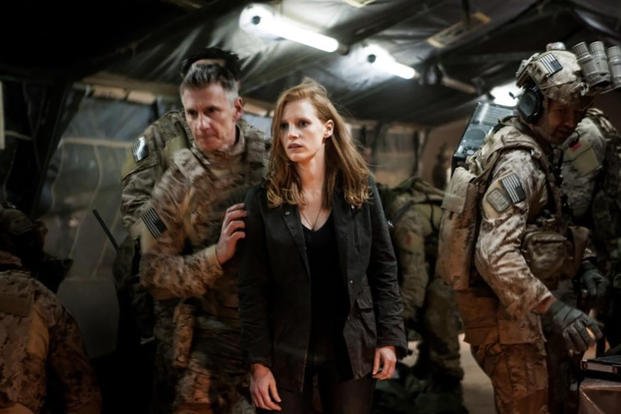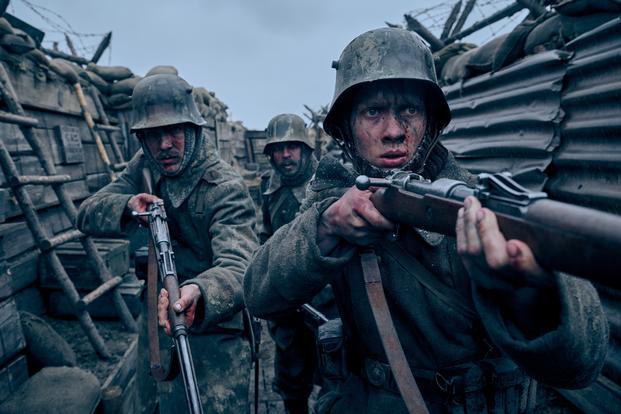In the last 15 years, we have been blessed to see the rise of a new golden age of war movies.
Hollywood has delivered some of the most gripping, gut-wrenching war films in decades, from boots-on-the-ground realism to historical epics oozing with nostalgia. While the last era of war films -- say, from "Apocalypse Now" to "Saving Private Ryan" -- may have set the stage for modern military cinema by pushing the bounds of technology, investing in character studies, and authentically and faithfully reproducing historical events, the 2010s and early 2020s have completely elevated the genre with a potent mix of action and diversity, unfettered storytelling and sheer technical prowess.
This renaissance is partly due to a shift in how we tell war stories. Gone are the days of romanticized, black-and-white depictions of heroism, blind patriotism and other tired narrative tropes. Today’s war movies are messy, complex and unapologetically realistic. The modern military film isn’t just about underdog heroes overcoming insurmountable odds in spectacular fashion -- it’s about the very human soldiers caught in the thick of these conflicts. They’re about the deeply affective chaos of war.
Read Next: 'Warfare' Is One of the Best War Movies of the Post-9/11 Era
Technical Prowess

One of the biggest game-changers in recent war cinema is the pursuit of hyper-realism on screen. While modern combat dominates much of today’s war cinema, historical epics haven’t gone anywhere. In fact, they’ve only gotten bigger, bolder and more visually stunning. "Midway" (2019) took on one of the most pivotal battles of the Pacific Theater with staggering visual effects while retaining an old-school sense of spectacle. Even "Greyhound" (2020), starring Tom Hanks, managed to capture the nail-biting tension of naval warfare in a way that felt both classic and refreshingly modern.
Filmmakers of late have gone to unprecedented lengths to capture the raw intensity of battle, employing veteran military advisers, practical effects and innovative filming techniques, Take “Civil War” (2024), for example. Director Alex Garland consulted directly with Navy SEAL (and future “Warfare” collaborator) Ray Mendoza to capture the horror of modern urban warfare with terrifying accuracy. The firefights are brutal, the tactics are spot-on, and every gunshot carries a visceral weight -- enough to give viewers goosebumps.
Then there’s "1917," directed by Sam Mendes, which not only raised the bar but practically destroyed and rebuilt it by presenting a World War I narrative as a continuous, one-shot masterpiece. He and cinematographer Roger Deakins didn’t just make a film but crafted an immersive experience, one that drags the audience through dirt, dread and death in the trenches with staggering authenticity. The single shot following its main character as he desperately attempts to prevent the death of a soldier in a faraway unit brings viewers along for the ride, while the sound design allows anyone who watches to feel fully immersed in its horror.
Meanwhile, "Dunkirk" (2017) strips away traditional war movie tropes entirely. Instead of a deep singular character or small lead-cast backstory, director Christopher Nolan gave us both large- and small-scale tales of raw survival from an entire beach of English troops desperate to make it across the English Channel, to a boating family hoping to help even in a small way, to a trio of British Royal Air Force pilots desperate to stop the German Luftwaffe from decimating the stranded beach forces. The film’s ticking-clock intensity, lack of forced dialogue and nonlinear storytelling make it one of the most compelling war films ever made.
Authenticity Reigns

But beyond that technical prowess, which has landed military movies among the most critically acclaimed films in the last two decades, the dedication to telling the dark, truthful, painful stories of war has grown astronomically.
Long gone are the days of the uber-patriotic, near-propaganda-tinged films where a soldier of unimpeachable character makes it home victorious from war, gets the girl and lives happily ever after in the American dream. And unlike the war films of the mid-20th century, which often focused on the collective war effort, today’s military movies hone in on the often tragic, deeply personal costs of combat. Post-traumatic stress, survivor’s guilt, and the economic and emotional scars of war take center stage.
"Zero Dark Thirty," released roughly 13 years ago, set the tone for this subgenre, chronicling the decade-long hunt for Osama bin Laden with almost journalistic precision. It’s not just about the climactic raid -- it’s about the intelligence war, the moral dilemmas, the cost of obsession, and the emptiness and purposelessness that can plague someone when the fighting is over, even if they emerge victorious from their mission. Another, "Hacksaw Ridge" (2016), brought a fresh perspective to World War II by focusing on a combat medic who was a conscientious objector and refused to carry a weapon. The movie is incredibly emotional and hits at the messiness of retaining personal ethics out on the battlefield.
Take, too, "Thank You for Your Service" (2017), a criminally underrated film that explores the psychological struggles of veterans returning from Iraq. It doesn’t sugarcoat the trauma; rather, it forces audiences to confront the long-term effects of war in a way that is often uncomfortable despite its necessity. It hits hard at how difficult it can be to bridge the military-civilian divide and the scars of war that no one can see.
Similarly, “The Outpost" (2020) tells the harrowing true story of the Battle of Kamdesh while spotlighting the bonds between soldiers and the horrifying randomness of death in modern warfare. This harrowing firefight of a film explores what happens when a military mission becomes purely survival and how quickly combat can devolve into chaos. Heroism isn’t shrouded in gold and glory. It’s dirty, scary and messy.
A Variety of Voices

Diversity has also taken center stage as filmmakers set their sights on untold, but incredible true stories of disenfranchised groups not only rising to defeat evil forces but also to spur change and accomplish equality through hard-fought means.
“Devotion” (2022), for example, tells the unpolished story of the unlikely friendship between naval aviators Tom Hudner and Jesse Brown, who despite the racial prejudice of the era was the first Black pilot to finish the U.S. Navy's basic flight training program. Brown died on a mission in the early days of the Korean War, but Hudner remained a facet in the life of his surviving wife and daughter until his death. It’s a story of combat heroism but also of perseverance in the face of race-based adversity.
Similarly, Tyler Perry’s “The Six Triple Eight” (2024) focused on the insurmountable task of WWII mail sorting given to the first all-Black women’s unit 6888th Central Postal Directory Battalion, which was intended for them to fail and prove that they were inferior to white troops, especially men. Instead, the battalion succeeded and raised morale for the entire Army as well as families at home desperate to hear from their loved ones. They overcame the struggles of war, but also the battle stateside in a much larger fight for equality.
Moral Gray Areas

But we haven’t just been watching good-guy stories. Recent films have also forced us to examine the perspectives of those who were compelled to fight on what we now know to be the wrong side of history.
Movies such as the remake of “All Quiet on the Western Front” (2022) have shown us the moral gray areas of troops who fought with the “bad guys,” lacking a just cause while remaining deeply committed to fulfilling the duties of their countries. In it, you see young German boys stalwart, excited to join the brotherhood of the army. As it progresses, however, you witness the horrible, eventual cost of their unquestioning naivete as they die in muddy trenches not knowing what they’re fighting for as their government decides their fates in smoky, Scotch-laden luxury.
Meanwhile, the stomach-churning “The Zone of Interest” (2024) reveals what duplicity looks like from the perspective of a high-ranking Nazi family living next door to a concentration camp. Through its disturbingly brilliant use of sound, the film never really shows you the ongoing atrocities -- but you can hear it. All the while, the family patriarch explores the justification for his role as part of his honor-bound, military duty and the best way to provide for his family while growing disillusioned about just how sickening the mission he accepted is.
These films do a careful job of not encouraging audiences to sympathize with or justify the German or Nazi experience, but they have forced viewers to ask important questions about what they would do -- how their morality might bend -- in such circumstances. These types of films are intended to make us uncomfortable as we contemplate whether we, too, would comply with doing evil to survive, or if we would be willing to suffer and sacrifice ourselves to instead do the right thing.
It’s a lot to think about -- and with good reason. Over the last two decades in particular, military movies have become more cerebral, philosophical and psychological rather than outright action films or celebratory or romantic ones (think “Pearl Harbor,” where death is more of a plot device), because the cost of war is one that we, after two decades and a Forever War, will continue to pay for decades to come. The ravages of two world wars have left humanity permanently scarred, and as a species, we continue to see violence around the world despite never-ending calls for peace and conciliation.
The majority of audiences have not and will not see combat in their lifetimes, but these films -- ones that don’t romanticize war -- are in fact of a golden age and will hopefully stir public sentiment that conflict is terrible and only to be pursued as a last resort. And for military veterans who are becoming a smaller and smaller piece of the population, the accuracy of these films can only help to bridge the military-civilian divide and provide insight into the harrowing experience of war. With no shortage of stories to tell and the evolution of film technology, this may just be the beginning of the golden era for military movies.
Keep Up With the Best in Military Entertainment
Whether you're looking for news and entertainment, thinking of joining the military or keeping up with military life and benefits, Military.com has you covered. Subscribe to the Military.com newsletter to have military news, updates and resources delivered straight to your inbox.








